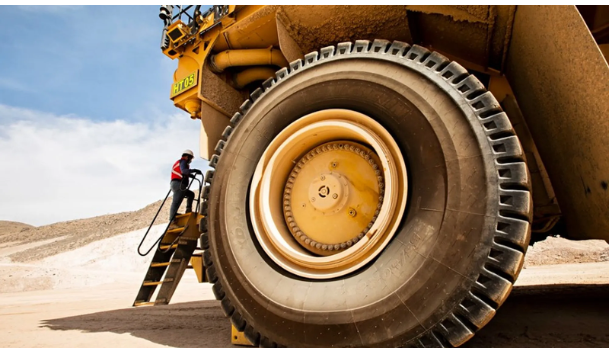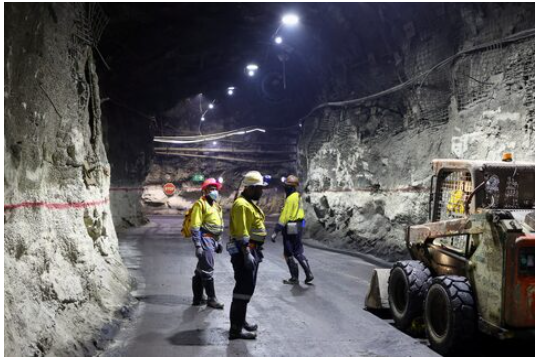 South Africa’s mining industry, historically a cornerstone of the nation’s economy, continues to grapple with a complex mix of challenges, as recent output data reveals both positive and negative trends. The mining sector has long been a key driver of South Africa’s economic growth, employment, and export earnings, but a combination of global and domestic pressures has weighed heavily on the industry in recent years.
South Africa’s mining industry, historically a cornerstone of the nation’s economy, continues to grapple with a complex mix of challenges, as recent output data reveals both positive and negative trends. The mining sector has long been a key driver of South Africa’s economic growth, employment, and export earnings, but a combination of global and domestic pressures has weighed heavily on the industry in recent years.
Recent mining output figures offer a mixed picture of the sector’s current health, signaling that while some areas show resilience, the broader struggles persist. The industry faces a delicate balancing act between economic opportunities and systemic issues that have hampered its ability to fully rebound.
South Africa’s mining output for the latest reporting period shows contrasting trends across different mineral commodities. Gold, once the lifeblood of the country’s mining sector, continues its long-term decline, with output falling due to depleting reserves and high operational costs. Meanwhile, platinum group metals (PGMs), a major component of South Africa’s mining exports, experienced modest growth, supported by increasing global demand for their use in automotive catalysts and green technologies like hydrogen fuel cells.
However, the output of iron ore, coal, and diamonds has been sluggish. The coal sector, once a key contributor to the country’s electricity generation and export revenues, faces challenges from global shifts towards cleaner energy sources, domestic supply disruptions, and policy uncertainty. This has further strained the already struggling Eskom, South Africa’s power utility, which relies heavily on coal to meet the nation’s electricity demands.
Iron ore output has similarly stagnated due to weaker demand from key trading partners such as China, which has been reducing its reliance on imported steel-making materials. Diamond production, another historically significant part of South Africa’s mining industry, has been in decline as mature mines approach the end of their lifespans.
On the other hand, the ongoing global energy transition has created a bright spot for minerals like lithium, cobalt, and rare earth elements, which are critical for batteries and renewable energy technologies. South Africa holds significant reserves of these minerals, and there is hope that strategic investment in exploration and production could help the mining sector pivot towards new growth areas. However, the current output data shows that these initiatives have yet to gain significant traction.
The persistent struggles in South Africa’s mining sector stem from a combination of external market forces and internal structural issues. Global commodity price volatility, driven by fluctuating demand and geopolitical tensions, has created an unpredictable environment for mining companies. Coupled with rising input costs particularly energy and labor mining profitability has been under significant pressure.
Domestically, the industry faces a host of challenges that have slowed its recovery and growth. Among the most pressing are energy shortages, regulatory uncertainty, and labor disputes. South Africa’s ongoing electricity crisis, characterized by frequent load-shedding, has disrupted mining operations, driving up production costs and delaying output. Many mines are energy-intensive, and the unreliability of Eskom’s supply has forced some operators to invest in costly backup solutions, further eroding profit margins.
In addition, regulatory uncertainty continues to weigh on investor confidence. While the South African government has made efforts to reform mining laws and create a more investor-friendly environment, concerns remain over issues such as ownership requirements, environmental regulations, and the slow pace of licensing approvals. These factors have deterred much-needed investment in the sector, particularly in the exploration of new mineral resources.
Labor unrest, a recurring issue in South Africa’s mining sector, also remains a significant challenge. Wage disputes between mining companies and labor unions have historically led to strikes that disrupt production. Although the government and industry leaders have attempted to improve labor relations, the risk of strikes and protests continues to pose a threat to output stability.
On the global stage, South Africa’s mining industry is contending with both opportunities and challenges. The rising demand for green technologies such as electric vehicles, solar panels, and wind turbines has increased the demand for certain minerals like PGMs and copper. South Africa, as one of the world’s largest producers of platinum and palladium, stands to benefit from this shift. However, to fully capitalize on this opportunity, the country must modernize its mining sector and attract new investments into mining technology and infrastructure.
 Conversely, the global transition away from fossil fuels has had a direct impact on South Africa’s coal industry. As many countries seek to reduce carbon emissions, demand for coal has declined, putting pressure on South Africa’s coal mines. This trend is expected to continue, raising questions about the long-term sustainability of coal as a key driver of the economy.
Conversely, the global transition away from fossil fuels has had a direct impact on South Africa’s coal industry. As many countries seek to reduce carbon emissions, demand for coal has declined, putting pressure on South Africa’s coal mines. This trend is expected to continue, raising questions about the long-term sustainability of coal as a key driver of the economy.
China, South Africa’s largest trading partner for minerals such as iron ore, has also introduced uncertainties into the market. China’s slowing economic growth and its efforts to reduce steel production as part of its environmental goals have dampened demand for iron ore, one of South Africa’s most important exports. The impact of this shift has been felt across the industry, contributing to the sluggish performance in iron ore output.
Despite the mixed signals from recent mining output data, there is cautious optimism about the future of South Africa’s mining industry. The sector remains one of the largest employers in the country, and with the right reforms and investments, it could once again play a pivotal role in driving economic growth.
To address the challenges, the South African government has announced plans to improve the regulatory environment, streamline licensing processes, and provide support for energy generation within the mining sector. There is also increasing focus on diversifying the industry to reduce reliance on declining commodities like coal and gold, and instead focus on minerals that are vital to the global energy transition.
Investment in mining technology, infrastructure, and green energy is seen as key to unlocking the sector’s potential. Modernizing mining operations through the use of automation, artificial intelligence, and renewable energy sources could significantly reduce costs and improve efficiency.
However, without a clear and consistent policy framework, the sector will likely continue to face uncertainty. Collaboration between the government, mining companies, labor unions, and other stakeholders will be crucial to building a sustainable and resilient future for South Africa’s mining industry.
The mixed performance in South Africa’s mining output reflects the sector’s ongoing struggles, as it navigates a challenging landscape of global market shifts and domestic structural issues. While certain commodities like platinum and rare earth minerals present opportunities for growth, the industry faces significant hurdles, including energy shortages, regulatory uncertainty, and labor unrest. With targeted reforms and strategic investments, the sector has the potential to recover and adapt to the changing global economy, but overcoming these challenges will require sustained effort from both the government and private sector players.

